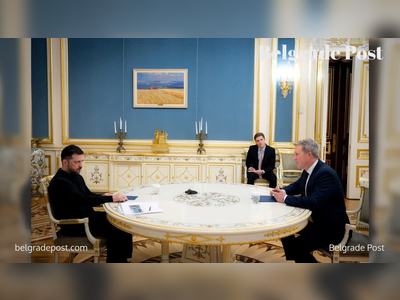European Court Rules on 'Pfizergate' Case Involving Ursula von der Leyen
The European Commission must disclose SMS communications linked to vaccine contracts amid transparency concerns.
The European Court of Justice has determined that the European Commission erred in its refusal to publish SMS messages exchanged between European Commission President Ursula von der Leyen and Albert Bourla, CEO of Pfizer, during the COVID-19 pandemic.
Journalists requested access to these messages, which are central to the controversy dubbed 'Pfizergate,' concerning contracts related to vaccine procurement.
The Commission failed to convincingly justify its stance that the messages did not contain significant information.
Initially, the existence of the messages was denied, but they were later confirmed during an interview with von der Leyen in 2021. The Court emphasized that the Commission cannot assert a lack of requested documents without providing an explanation that allows the public to understand the rationale behind their non-disclosure.
This ruling may have significant implications for transparency practices within the European Union (EU).
The European Commission, representing the 27 EU member states, signed a contract worth up to €35 billion for the procurement of 1.8 billion doses of vaccines in 2021. The New York Times and its correspondent, Matina Stevis-Gridneff, filed a lawsuit citing violations of transparency rights after the European Commission did not respond to the request for access to the messages.
The newspaper indicated that personal communications between von der Leyen and Bourla were critical in facilitating the vaccine agreement at the height of the COVID-19 crisis.
In response to the journalists’ request for the messages, the Commission stated that it 'DOES NOT POSSESS SUCH DOCUMENTS,' drawing severe criticism.
The European Ombudsman condemned the Commission's handling of information requests in 2022. Additionally, the European Public Prosecutor's Office conducted an investigation into vaccine procurement in the EU. Separately, the General Court of the EU noted last year that the Commission did not provide sufficient public insight into vaccine contracts.
During a hearing on November 15, 2024, in Luxembourg, the New York Times’ attorney, Bondin Kluetra, accused the Commission of violating principles of good administration, highlighting the importance of the contentious messages.
Paolo Stancanelli, the European Commission's lawyer, contended that the text messages were not part of the negotiations regarding vaccine delivery terms.
While acknowledging their existence, he stressed that negotiations were not conducted via SMS.
In 2022, the Commission's services requested the messages from Ursula von der Leyen's office, but were informed that they 'COULD NOT BE FOUND.' The 'Pfizergate' controversy has sparked numerous debates within European institutions over the past three years.
Journalists requested access to these messages, which are central to the controversy dubbed 'Pfizergate,' concerning contracts related to vaccine procurement.
The Commission failed to convincingly justify its stance that the messages did not contain significant information.
Initially, the existence of the messages was denied, but they were later confirmed during an interview with von der Leyen in 2021. The Court emphasized that the Commission cannot assert a lack of requested documents without providing an explanation that allows the public to understand the rationale behind their non-disclosure.
This ruling may have significant implications for transparency practices within the European Union (EU).
The European Commission, representing the 27 EU member states, signed a contract worth up to €35 billion for the procurement of 1.8 billion doses of vaccines in 2021. The New York Times and its correspondent, Matina Stevis-Gridneff, filed a lawsuit citing violations of transparency rights after the European Commission did not respond to the request for access to the messages.
The newspaper indicated that personal communications between von der Leyen and Bourla were critical in facilitating the vaccine agreement at the height of the COVID-19 crisis.
In response to the journalists’ request for the messages, the Commission stated that it 'DOES NOT POSSESS SUCH DOCUMENTS,' drawing severe criticism.
The European Ombudsman condemned the Commission's handling of information requests in 2022. Additionally, the European Public Prosecutor's Office conducted an investigation into vaccine procurement in the EU. Separately, the General Court of the EU noted last year that the Commission did not provide sufficient public insight into vaccine contracts.
During a hearing on November 15, 2024, in Luxembourg, the New York Times’ attorney, Bondin Kluetra, accused the Commission of violating principles of good administration, highlighting the importance of the contentious messages.
Paolo Stancanelli, the European Commission's lawyer, contended that the text messages were not part of the negotiations regarding vaccine delivery terms.
While acknowledging their existence, he stressed that negotiations were not conducted via SMS.
In 2022, the Commission's services requested the messages from Ursula von der Leyen's office, but were informed that they 'COULD NOT BE FOUND.' The 'Pfizergate' controversy has sparked numerous debates within European institutions over the past three years.
AI Disclaimer: An advanced artificial intelligence (AI) system generated the content of this page on its own. This innovative technology conducts extensive research from a variety of reliable sources, performs rigorous fact-checking and verification, cleans up and balances biased or manipulated content, and presents a minimal factual summary that is just enough yet essential for you to function as an informed and educated citizen. Please keep in mind, however, that this system is an evolving technology, and as a result, the article may contain accidental inaccuracies or errors. We urge you to help us improve our site by reporting any inaccuracies you find using the "Contact Us" link at the bottom of this page. Your helpful feedback helps us improve our system and deliver more precise content. When you find an article of interest here, please look for the full and extensive coverage of this topic in traditional news sources, as they are written by professional journalists that we try to support, not replace. We appreciate your understanding and assistance.










